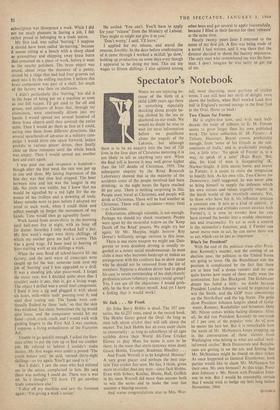Two Cheers for Forster He is eighty-five now, and with
each half- decade the body of tributes to E. M. Forster seems to grow larger than his own published work. The latest collection (E. M. Forster : A Tribute, Harcourt, Brace) comes, predictably enough, from 'some of his friends in the sub- continent of India,' and is, predictably enough, too, a little trite : `To speak of Forster is, in a way, to speak of a saint' (Rajo Rao); 'But, alas, his kind of man is disappearing' (K. Natwar-Singh). A little nearer home, and nearer to Forster, it is easier to resist the• temptation to beatify him. As his own title, Two Cheers for Democracy, itself suggested, he was never able to bring himself to supply the defences which his own virtues and values urgently require in the harsh world of the twentieth century. Yet, to those who have felt it, his influence remains a constant one. It acts as a kind of control : if your own ideas and attitudes cannot co-exist with Forster's, it is time to wonder how far you have crossed the border into a muddy obscurant- ism and irrationality. To act as such a control is the rationalist's function; and, if Forster can never move men to act, he can move them not to act, which can be just as important.






























 Previous page
Previous page